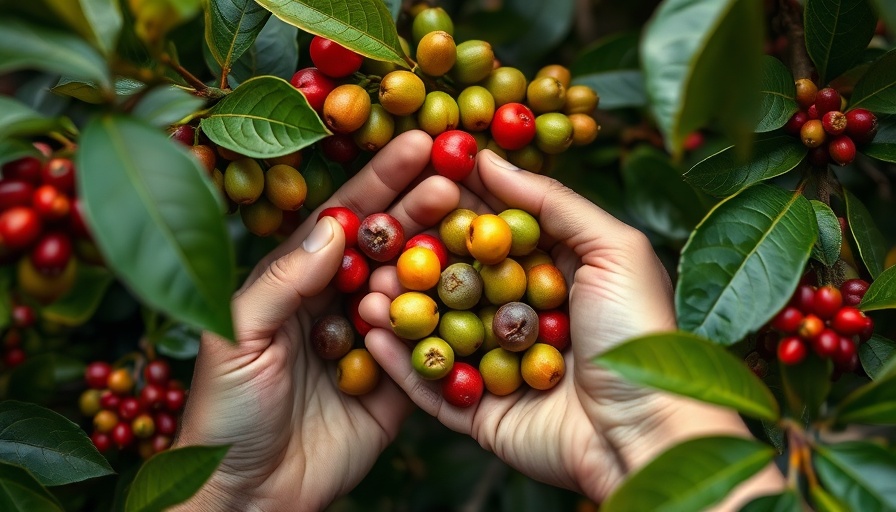
The Origins of Coffee: A Rich History
This cup of coffee might just be more than a morning ritual; it is an echo of history that began over a thousand years ago in Eastern Africa. Legend tells of Kaldi, a goat herder from the Kaffa region of Ethiopia, whose curious nature led him to discover the energizing properties of coffee berries. This discovery consumed the attention of local monks, who leveraged it to enhance their lengthy prayers. Fast-forward to today, coffee is an indispensable part of various cultures, particularly in Ethiopia, where expressions like 'Buna dabo naw' (Coffee is our bread) capture its societal significance.
Why African Coffee Matters in Today's Market
Currently, coffee remains integral to the economies of Eastern African countries. Specialty beans like Kenya AA and Ethiopia Yirgacheffe are not just delicious; they are highly sought-after commodities on the global stage, generating income that directly supports the livelihoods of farmers and their communities. The rich biodiversity and optimal climates of regions like the Lake Victoria Crescent allow both Arabica and Robusta varieties to thrive, contributing to the diverse flavors that coffee enthusiasts enjoy.
The Ecological Significance of Coffee Cultivation
It’s not only about the economy; coffee cultivation in Africa plays a pivotal role in maintaining ecological balance. The practices of traditional farming methods have been passed down through generations, ensuring sustainable production that respects the land. However, with logging and urbanization threatening this balance, there is a pressing need for conscious cultivation practices that safeguard environmental integrity while maintaining coffee quality.
Modern Brewing Techniques: Merging Tradition with Innovation
As the world embraces technological advancements, coffee brewing is no exception. Minimalist home setups with pour-over kits or sophisticated espresso machines reflect a shift towards enhancing coffee’s flavor profile. Alongside traditional methods, innovations like IoT-enabled coffee machines are emerging, giving enthusiasts new ways to experience their brew. This melding of old and new promises intriguing possibilities for coffee lovers, possibly paving the way for new blends that could redefine the global palette.
Future Trends in Coffee: What Lies Ahead?
As consumer preferences evolve, the future of coffee looks promising yet requires attention. With the rise of eco-conscious consumers, there is a growing expectation for traceable and ethically sourced products. This push aligns with broader global trends in sustainability and digital transparency across industries, fundamentally restructuring how we approach food production and consumption. For coffee, this means not only maintaining quality and flavor but also integrating sustainable practices that honor the origins of this cherished crop.
The Cultural Impact of Coffee: A Global Connection
From the streets of Nairobi to cafés in Paris, coffee has woven its way through cultures worldwide, symbolizing connection, creativity, and community. For many, the act of sharing coffee embodies hospitality—bridging cultures and igniting conversations. In a rapidly digitalizing world, where real human connection sometimes fades, the communal aspect of coffee drinking can foster meaningful relationships, providing a space for dialogue and understanding.
Take Action: Savor and Support African Coffee
As executives and decision-makers, consider how your palate choices can influence the global coffee landscape. By choosing specialty African coffees, not only do you enjoy exceptional flavors, but you also support sustainable practices that empower communities. Explore local coffee shops offering African blends or purchase directly from ethical suppliers to further this vital connection.
 Add Row
Add Row  Add
Add 




Write A Comment